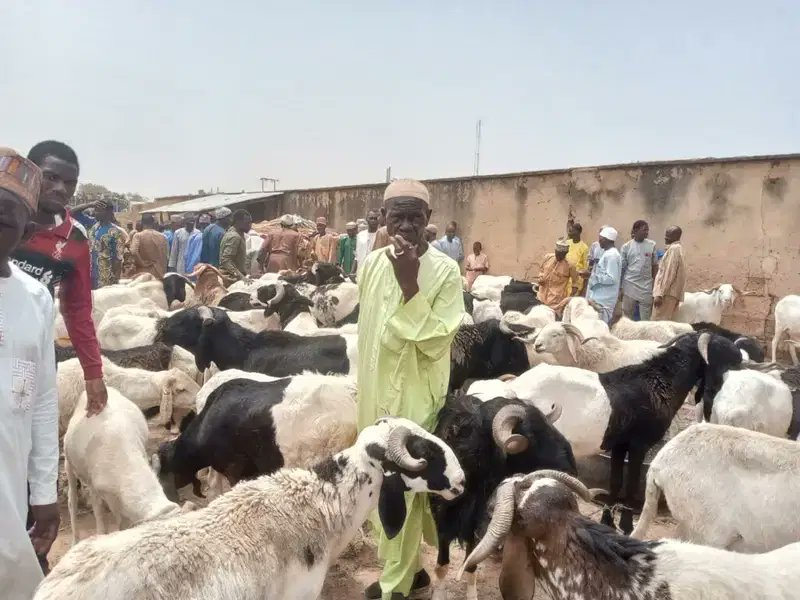As Nigeria approaches the Eid-el-Kabir (Sallah) celebration, expected around June 6 or 7, 2025, ram dealers across the country are facing an unprecedented crisis: a drastic drop in patronage coupled with a severe shortage of livestock. The festive season, which traditionally sees a surge in demand for rams for the symbolic sacrifice commemorating Prophet Ibrahim’s devotion, is now marked by economic hardship, skyrocketing prices, and logistical challenges that threaten to dampen the spirit of the holiday.
A Perfect Storm of Economic Woes
Nigeria’s inflation rate, hovering around 23.71% as of early 2025, has eroded the purchasing power of millions, making the ritual purchase of rams a luxury many can no longer afford. With the national minimum wage pegged at ₦71,000, the cost of rams has become prohibitive for the average household. Dealers report that prices have surged by approximately 45% compared to last year’s Sallah season. Small rams now start at ₦150,000, while larger, healthier ones can fetch as much as ₦1.2 million in major markets like Lagos, Abuja, and Kano. This price escalation has left many Nigerians, already grappling with rising costs of food, fuel, and transportation, unable to participate in the traditional sacrifice.
Ahmed Usman, a ram seller in Lagos’ Agege market, shared his frustration: “Last year, I sold over 50 rams in the week before Sallah. This year, I’ve barely sold 10. People come, ask for prices, and walk away shaking their heads. They say they can’t afford it.” Usman’s experience is echoed across the country, with dealers in northern livestock hubs like Sokoto, Katsina, and Jigawa reporting similar struggles.
Soaring Costs of Feed and Transportation
The cost of maintaining livestock has also skyrocketed. The price of animal feed has surged from ₦3,000 per bag last year to ₦8,000–₦9,000 in 2025, driven by inflation and the high cost of agricultural inputs. Dealers who invest in fattening rams for Sallah are struggling to break even, as the increased costs are passed on to consumers who are already stretched thin.
Transportation expenses have further exacerbated the situation. With fuel prices remaining high and Nigeria’s road infrastructure in poor condition, the cost of moving rams from rural areas to urban centers has risen sharply. A journey that once cost ₦50,000 per truckload now exceeds ₦100,000, according to dealers in Katsina. These costs are inevitably reflected in market prices, making rams even less affordable.
Regional Variations and Market Dynamics
The situation varies across Nigeria’s regions. In northern states like Sokoto and Kano, where livestock rearing is a major industry, dealers have slightly more access to rams, but even there, prices are prohibitive. Southern markets, heavily reliant on northern and cross-border supplies, are hit hardest by the shortage. In Lagos, for example, the popular Oke-Afa market is unusually quiet, with fewer rams on display and even fewer buyers.
In rural areas, some communities are turning to collective solutions, pooling resources to purchase a single ram for shared sacrifice. However, this practice is less common in urban centers, where individualism and economic pressures dominate.
A Call for Government Intervention
Dealers and consumers alike are calling for government intervention to address the crisis. Some have urged the federal government to negotiate with Niger Republic to ease the export ban, while others advocate for subsidies on animal feed and transportation to reduce costs. “The government needs to do something about the price of feed and fuel,” said Musa Abdullahi, a dealer in Jigawa. “If they don’t, next year will be even worse.”
There are also calls for improved security in the north to ensure safer transportation routes for herders and traders. Without addressing these systemic issues, the livestock trade risks further decline, threatening not only the livelihoods of dealers but also the cultural and religious traditions tied to Sallah.
A Glimmer of Hope Amid Challenges
Despite the grim outlook, some dealers remain optimistic, banking on last-minute sales as the Sallah date approaches. Historically, the final days before Eid-el-Kabir see a surge in purchases, as families make sacrifices to fulfill religious obligations. However, with economic conditions showing little sign of improvement, dealers are bracing for one of the toughest Sallah seasons in recent memory.
For now, the rams in Nigeria’s markets stand patiently, their bleats echoing through half-empty stalls, as dealers and consumers alike navigate the delicate balance between tradition and survival in a challenging economic landscape.
Join our Whatsapp channel to stay updated always!


